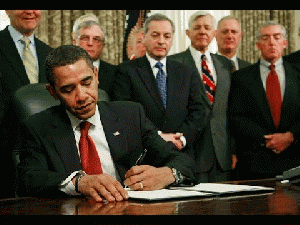The US House of Representatives voted 225-201 last week for a measure "providing for authority to initiate litigation for actions by the President or other executive branch officials inconsistent with their duties under the Constitution of the United States."
Translation: House Republicans approved the use of public time and resources to support Speaker John Boehner's strategy to stir up the conservative base with a lawsuit challenging President Obama's authority to do what previous presidents have done.
So, despite the fact that a majority of Americans see the lawsuit as a "political stunt," it will be pursued because, as House Budget Committee chairman Paul Ryan says, "We want to show that we're not going to take this lying down."
The timing of the vote -- just before the August congressional break in a critical election year -- certainly suggests that this lawsuit is more about politics than the Constitution. But political moves matter, especially at the presidential level. They matter electorally. And they matter from a policy standpoint.
So what's significant here is the question of whether Obama will be intimidated by Boehner's initiative.
The immediate answer would appear to be "no."
Though they have many complaints -- topped by the usual objections to implementation of the Affordable Care Act -- Boehner's minions have repeatedly raised particularly loud objections regarding the issuance of executive orders that that they see as too ambitious in their intention to protect the environment, aid vulnerable children and better the condition of workers. Yet, after the House voted to back Boehner, Obama issed another order.
Click Here to Read Whole Article
In fact, he issued one of the most important orders of his presidency. The Fair and Safe Workplaces Order outlines a set of requirements that are designed to steer federal contracts toward companies that respect labor and civil rights laws.
The president's order is important. "Currently, there are about 24,000 contractors doing business with the federal government, employing about 28 million workers," explains Communications Workers of America president Larry Cohen. "By requiring prospective federal contractors to disclose labor law violations, including illegal discrimination and firing of workers who want to exercise their right to organize, more companies may decide that obeying the law and respecting workers' rights is the smart move after all."
While Obama's order is significant, it is not radical -- in practice or in the context of past presidential orders.
The order uses transparency (disclosure and reporting requirements for companies) to assure that agencies awarding federal contracts can take into consideration whether bidders for federal contracts have complied with health and safety requirements, wage and hours protections, collective bargaining rules and civil rights laws.
"Requiring companies to disclose their recent compliance with labor and employment laws and allowing agencies to consider those records in the bid process will better ensure that companies receiving taxpayer-funded contracts actually satisfy our nation's basic wage and workplace standards," explains National Employment Law Project executive director Christine Owens...
"Formal consideration of compliance records in the bidding process will also level the playing field between bidders, reducing the ability of bottom-feeders to shortchange their employees in order to gain an unfair advantage over law-abiding competitors. And incentivizing federal contractors to obey the law protects taxpayers' interest in ensuring that their tax dollars do not underwrite illegal conduct such as wage theft, health and safety violations, and other unlawful practices that are not only inconsistent with our values but ultimately shift greater costs onto the American public."
The executive order creates new avenues for encouraging companies to respect protections for minorities and women in the workplace. In particular, notes National Women's Law Center co-president Marcia D. Greenberger, Obama's order "will prohibit companies with contracts of more than $1 million from forcing their employees to arbitrate violations of federal law prohibiting discrimination on the basis of race, sex, national origin, or religion or tort claims arising out of sexual harassment or sexual assault."






